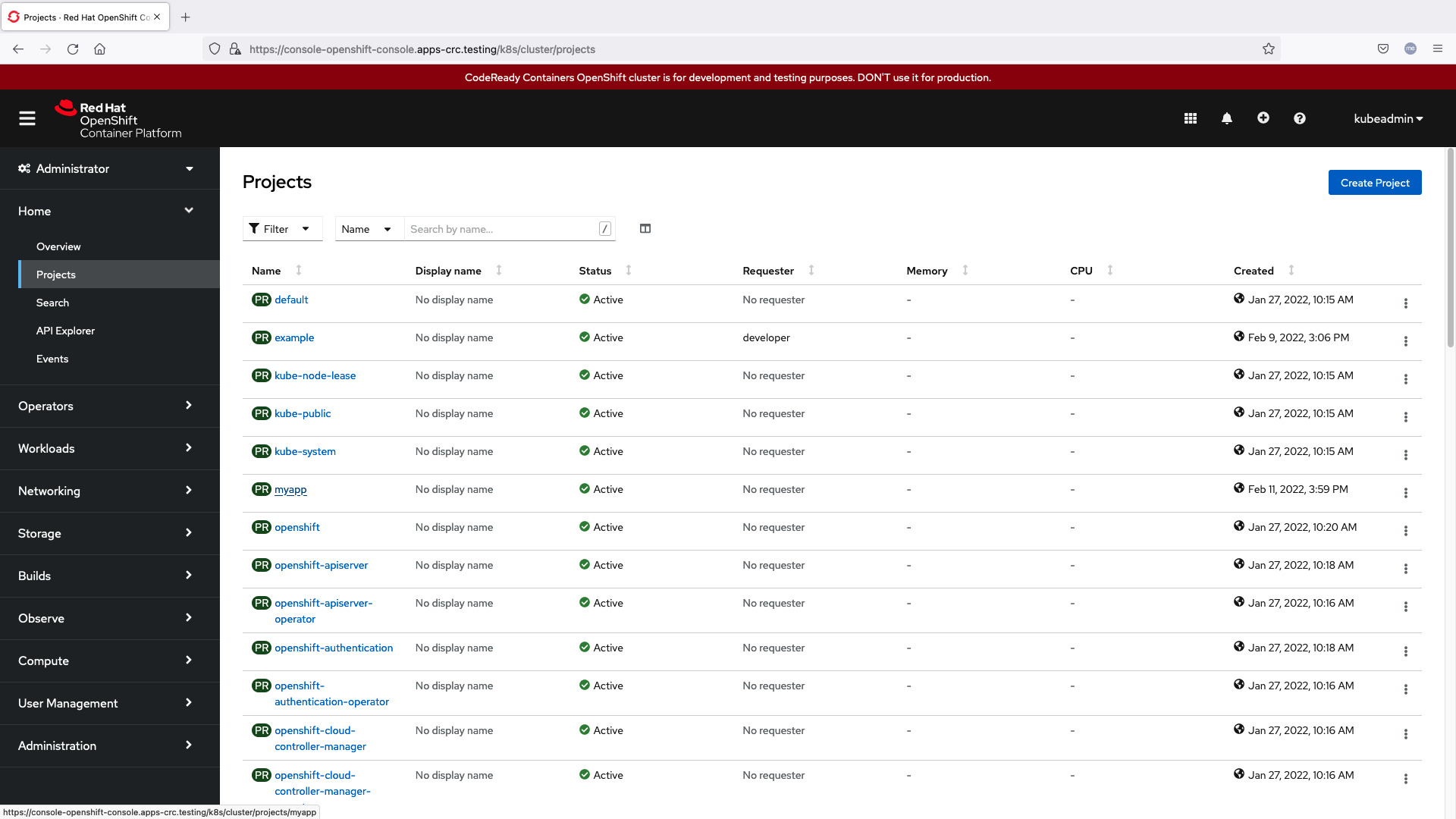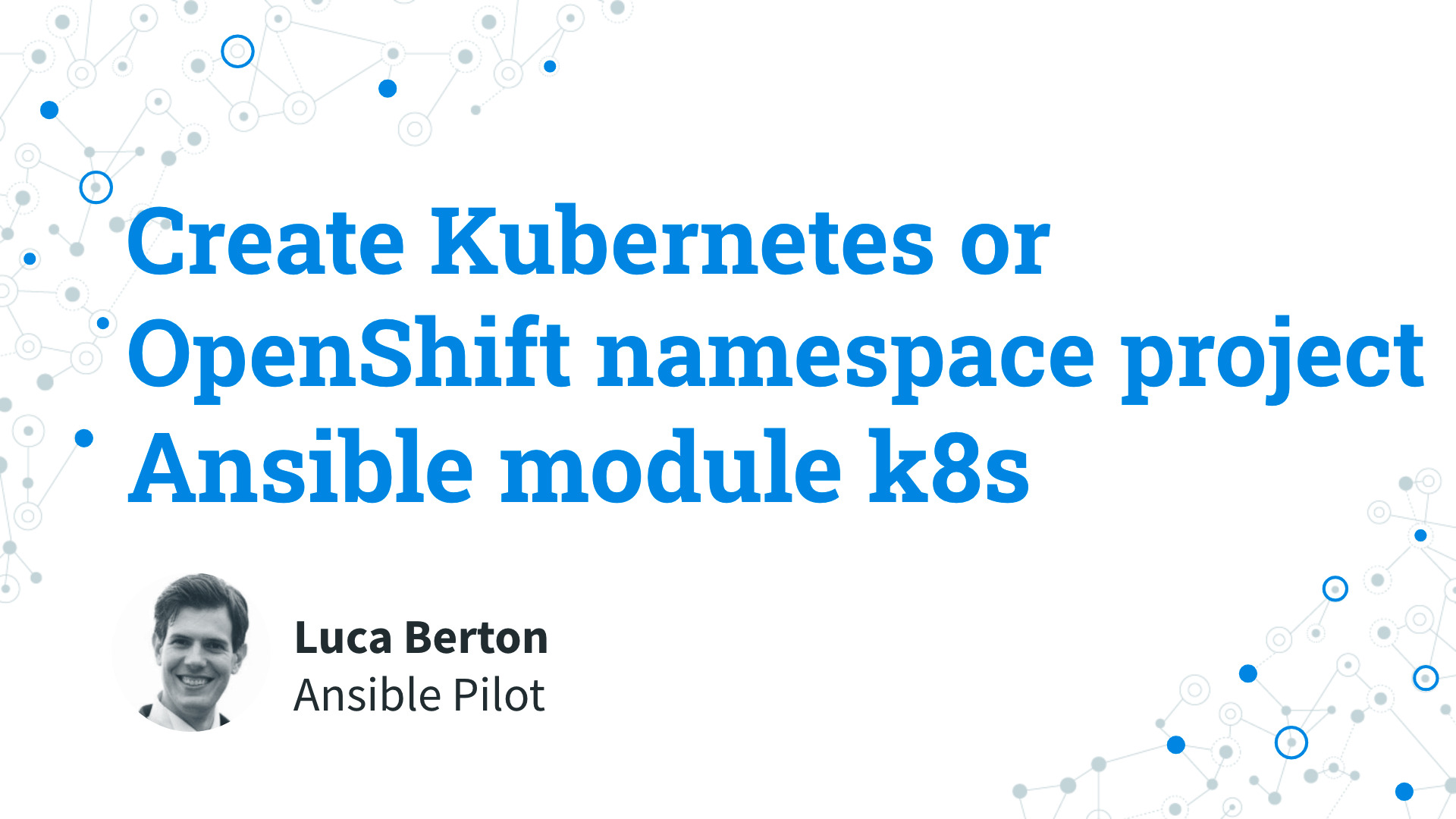How to create Kubernetes K8s or OpenShift OCP namespace project with Ansible?
I’m going to show you a live Playbook and some simple Ansible code. I’m Luca Berton and welcome to today’s episode of Ansible Pilot.
Ansible creates Kubernetes or OpenShift namespace project
kubernetes.core.k8s- Manage Kubernetes (K8s) objects
Let’s talk about the Ansible module k8s.
The full name is kubernetes.core.k8s, which means that is part of the collection of modules of Ansible to interact with Kubernetes and Red Hat OpenShift clusters.
It manages Kubernetes (K8s) objects.
Parameters
- name string /namespace string - object name / namespace
- api_version string - “v1”
- kind string - object model
- state string - present/absent/patched
- definition string - YAML definition
- src path - path for YAML definition
- template raw - YAML template definition
- validate dictionary - validate resource definition
There is a long list of parameters of the k8s module. Let me summarize the most used.
Most of the parameters are very generic and allow you to combine them for many use-cases.
The name and namespace specify object name and/or the object namespace. They are useful to create, delete, or discover an object without providing a full resource definition.
The api_version parameter specifies the Kubernetes API version, the default is “v1” for version 1.
The kind parameter specifies an object model.
The state like for other modules determines if an object should be created - present option, patched - patched option, or deleted - absent option.
The definition parameter allows you to provide a valid YAML definition (string, list, or dictionary) for an object when creating or updating.
If you prefer to specify a file for the YAML definition, the src parameter provides a path to a file containing a valid YAML definition of an object or objects to be created or updated.
You could also specify a YAML definition template with the template parameter.
You might find useful also the validate parameter in order to define how to validate the resource definition against the Kubernetes schema. Please note that requires the kubernetes-validate python module.
Links

Playbook
How to create Kubernetes namespace project with Ansible Playbook.
This Playbook uses Red Hat CodeReady Containers OpenShift 4 Cluster.
See also: Install Red Hat CodeReady Containers to run OpenShift 4 in macOS
code
---
- name: k8s Playbook
hosts: localhost
gather_facts: false
connection: local
vars:
project_name: "myapp"
tasks:
- name: create {{ project_name }} namespace
kubernetes.core.k8s:
api_version: v1
kind: Namespace
name: "{{ project_name }}"
state: present
execution
ansible-pilot $ crc status
CRC VM: Running
OpenShift: Running (v4.9.15)
Disk Usage: 15.71GB of 32.74GB (Inside the CRC VM)
Cache Usage: 12.79GB
Cache Directory: /Users/lberton/.crc/cache
ansible-pilot $ crc start
INFO A CodeReady Containers VM for OpenShift 4.9.15 is already running
Started the OpenShift cluster.
The server is accessible via web console at:
https://console-openshift-console.apps-crc.testing
Log in as administrator:
Username: kubeadmin
Password: WhDvM-c8WiV-zJ8iH-UKhKV
Log in as user:
Username: developer
Password: developer
Use the 'oc' command line interface:
$ eval $(crc oc-env)
$ oc login -u developer https://api.crc.testing:6443
ansible-pilot $ eval $(crc oc-env)
ansible-pilot $ oc login -u kubeadmin https://api.crc.testing:6443
Logged into "https://api.crc.testing:6443" as "kubeadmin" using existing credentials.
You have access to 65 projects, the list has been suppressed. You can list all projects with 'oc projects'
Using project "example".
ansible-pilot $ ansible-playbook kubernetes/namespace.yml
[WARNING]: No inventory was parsed, only implicit localhost is available
[WARNING]: provided hosts list is empty, only localhost is available. Note that the implicit
localhost does not match 'all'
PLAY [k8s Playbook] ***********************************************************************************
TASK [create myapp namespace] *********************************************************************
changed: [localhost]
PLAY RECAP ****************************************************************************************
localhost : ok=1 changed=1 unreachable=0 failed=0 skipped=0 rescued=0 ignored=0
ansible-pilot $
idempotency
ansible-pilot $ ansible-playbook kubernetes/namespace.yml
[WARNING]: No inventory was parsed, only implicit localhost is available
[WARNING]: provided hosts list is empty, only localhost is available. Note that the implicit
localhost does not match 'all'
PLAY [k8s Playbook] ***********************************************************************************
TASK [create myapp namespace] *********************************************************************
ok: [localhost]
PLAY RECAP ****************************************************************************************
localhost : ok=1 changed=0 unreachable=0 failed=0 skipped=0 rescued=0 ignored=0
ansible-pilot $
before execution
ansible-pilot $ oc projects | grep myapp
ansible-pilot $ oc projects
You have access to the following projects and can switch between them with ' project <projectname>':
default
* example
kube-node-lease
kube-public
kube-system
openshift
openshift-apiserver
openshift-apiserver-operator
openshift-authentication
openshift-authentication-operator
openshift-cloud-controller-manager
openshift-cloud-controller-manager-operator
openshift-cloud-credential-operator
openshift-cluster-csi-drivers
openshift-cluster-machine-approver
openshift-cluster-node-tuning-operator
openshift-cluster-samples-operator
openshift-cluster-storage-operator
openshift-cluster-version
openshift-config
openshift-config-managed
openshift-config-operator
openshift-console
openshift-console-operator
openshift-console-user-settings
openshift-controller-manager
openshift-controller-manager-operator
openshift-dns
openshift-dns-operator
openshift-etcd
openshift-etcd-operator
openshift-host-network
openshift-image-registry
openshift-infra
openshift-ingress
openshift-ingress-canary
openshift-ingress-operator
openshift-insights
openshift-kni-infra
openshift-kube-apiserver
openshift-kube-apiserver-operator
openshift-kube-controller-manager
openshift-kube-controller-manager-operator
openshift-kube-scheduler
openshift-kube-scheduler-operator
openshift-kube-storage-version-migrator-operator
openshift-kubevirt-infra
openshift-machine-api
openshift-machine-config-operator
openshift-marketplace
openshift-monitoring
openshift-multus
openshift-network-diagnostics
openshift-network-operator
openshift-node
openshift-oauth-apiserver
openshift-openstack-infra
openshift-operator-lifecycle-manager
openshift-operators
openshift-ovirt-infra
openshift-sdn
openshift-service-ca
openshift-service-ca-operator
openshift-user-workload-monitoring
openshift-vsphere-infra
Using project "example" on server "https://api.crc.testing:6443".
ansible-pilot $
after execution
ansible-pilot $ oc projects | grep myapp
myapp
ansible-pilot $ oc projects
You have access to the following projects and can switch between them with ' project <projectname>':
default
* example
kube-node-lease
kube-public
kube-system
myapp
openshift
openshift-apiserver
openshift-apiserver-operator
openshift-authentication
openshift-authentication-operator
openshift-cloud-controller-manager
openshift-cloud-controller-manager-operator
openshift-cloud-credential-operator
openshift-cluster-csi-drivers
openshift-cluster-machine-approver
openshift-cluster-node-tuning-operator
openshift-cluster-samples-operator
openshift-cluster-storage-operator
openshift-cluster-version
openshift-config
openshift-config-managed
openshift-config-operator
openshift-console
openshift-console-operator
openshift-console-user-settings
openshift-controller-manager
openshift-controller-manager-operator
openshift-dns
openshift-dns-operator
openshift-etcd
openshift-etcd-operator
openshift-host-network
openshift-image-registry
openshift-infra
openshift-ingress
openshift-ingress-canary
openshift-ingress-operator
openshift-insights
openshift-kni-infra
openshift-kube-apiserver
openshift-kube-apiserver-operator
openshift-kube-controller-manager
openshift-kube-controller-manager-operator
openshift-kube-scheduler
openshift-kube-scheduler-operator
openshift-kube-storage-version-migrator-operator
openshift-kubevirt-infra
openshift-machine-api
openshift-machine-config-operator
openshift-marketplace
openshift-monitoring
openshift-multus
openshift-network-diagnostics
openshift-network-operator
openshift-node
openshift-oauth-apiserver
openshift-openstack-infra
openshift-operator-lifecycle-manager
openshift-operators
openshift-ovirt-infra
openshift-sdn
openshift-service-ca
openshift-service-ca-operator
openshift-user-workload-monitoring
openshift-vsphere-infra
Using project "example" on server "https://api.crc.testing:6443".
ansible-pilot $

Conclusion
Now you know how to create Kubernetes or OpenShift namespace projects with Ansible.
Subscribe to the YouTube channel, Medium, and Website, X (formerly Twitter) to not miss the next episode of the Ansible Pilot.Academy
Learn the Ansible automation technology with some real-life examples in my
Udemy 300+ Lessons Video Course.

My book Ansible By Examples: 200+ Automation Examples For Linux and Windows System Administrator and DevOps

Donate
Want to keep this project going? Please donate
